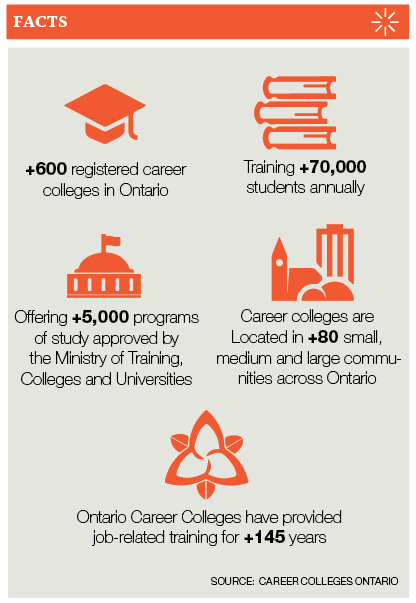Career Colleges: The Key To Employable Graduates
Student Perspective With unemployment pushing double digits across Canada, the question of what exactly education is for has never been more important.

Certainly there is value in self-improvement and learning for learning’s sake, but it is getting harder and harder for Canadians to justify an education that may not have a job waiting at the end of it. For those with or without a degree, the most pressing issue is one of acquiring the specific skills that lead to employment.
In terms of increased employability, and gaining job-specific skills, prospective students can consider career colleges. Career colleges are private institutions that provide career specific training, often in direct partnership with employers.
“From the employer’s perspective, they know they’re getting a quality individual who can fill their jobs... From the student’s perspective, it means they know they’ll have a job when they graduate.”
There are overlaps in some cases between the programs found at career colleges and those found at community colleges, but according to Career Colleges Ontario Chair George Hood, the big difference comes down to scope and efficiency. “In a one year program at a career college, students in many fields can become fully trained and employable,” says Hood. Because career colleges are tightly focused on job skills, omitting the electives and general education components most community college programs include, the programs are often substantially shorter.
An impressive educational pedigree
There is unquestionable historical precedent for the model. “The Ontario Community College system started in the mid-1960s,” explains Hood, “whereas private career colleges have existed for well over 100 years, arguably dating back to at least the 1700s.” The National Association of Career Colleges (NACC), established in 1896, is the oldest post-secondary association in Canada and the tradition of private vocational schools has a direct line of descent from the medieval guild system.
The reason this system has survived centuries of economic and political upheaval is an unswerving focus on educating people towards jobs that actually exist. As Canada enters the “skills gap” years, where large numbers of people without jobs exist alongside a growing number of jobs without people, the career college system can help train or retrain people in the specific skills where people are most needed, resulting in highly-employable graduates. “From the employer’s perspective, they know they’re getting a quality individual who can fill their jobs,” says Serge Buy,

CEO of NACC. “From the student’s perspective, it means they know they’ll have a job when they graduate.”
Canada Job Grant and the Canada-Ontario Job fund
The importance of career-focused education has not been lost on politicians and lawmakers. The Canada Job Grant program, which was a centrepiece of the 2013 Federal Budget, provides up to $15,000 of funding for each career college student. This is critically important when you consider that so many new students entering career college programs have already completed university or community college programs and are carrying the associated debt.
For this generation of Canadians, who know an education alone does not guarantee a job, career colleges provide a way to bridge the skills gap. And when that gap is bridged, all Canadians benefit.


.jpg)
